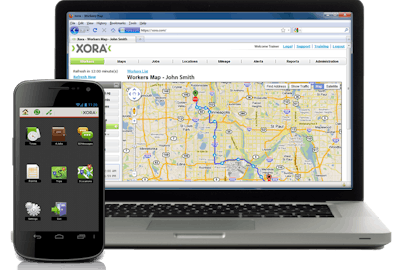
While mobile employees get plenty of attention, there is one group that may be overlooked: your office-based managers whose job it is to supervise your mobile employees, either individually or as members of teams. These managers can make the difference between a successful implementation of technology and an epic fail.
For starters, think about the challenges landscape care managers face every day: The mobile workers they are responsible for are highly decentralized and on the move nearly all the time. Staff may change on a daily basis and certainly on a seasonal basis, making it difficult to keep track of who’s working on any given day.
Mobile technology helps your office managers communicate with your mobile workers — and vice versa — but by and large, these workers are on their own.
Even when their locations are known — as is the case when mobile workforce solutions are GPS-enabled and workers’ locations can be displayed on a map accessed through an Internet connection — it can be hard to know when things are working well and when they aren’t.
Sometimes the first hint is a phone call from an angry customer: That’s what you want to avoid.
Bottom line, as powerful as technology can be in increasing the productivity and efficiency of your mobile workers, human factors also play an essential role.
Here are four things you can do to help your managers manage your mobile workers:
1. Encourage Your Managers to Engage and Build Relationships
When your managers are not regularly face to face with their employees, it’s easy for communication to become perfunctory —assigning jobs, scheduling and answering routine questions.
But when managing employees who are mobile, it’s even more important that your managers are always engaged and interacting with them to build relationships, teamwork and trust.
It’s also important for your mobile employees to feel connected to your company and for you to have a good sense of who are your strongest and weakest performers.
Encourage your managers to share information in the form of stories, anecdotes and tips that might help mobile employees do their jobs better.
Make sure they get to know your mobile workers to give them a sense of inclusion and provide you with a better sense of what motivates them. And always keep the lines of communication open and two-way.
2. Train Managers to Communicate Expectations Clearly and Provide Feedback in Real Time
Communication is always the key to successful working relationships.
But when workers are mobile and most interactions are through technology, it is even more important for managers to be clear with employees about what is expected of them so there are no misunderstandings.
In addition, when managing mobile workers, it’s tempting for managers to transmit lots of information in every single interaction: Who knows when you might be able to talk with them again?
Train your managers to resist this temptation and instead have more frequent interactions with mobile employees in which they communicate one or two key points and provide time for employees to ask clarifying questions.
Finally, encourage your managers to give feedback to mobile employees in real time, recognizing good work and offering constructive criticism immediately.
3. Teach Your Managers to Ask Lots of Questions
Because managers cannot observe the work and work habits of mobile employees firsthand, they need other ways to determine when something is wrong. One technique is to ask probing questions of mobile workers during phone conversations.
For example, instead of asking “How did your shift go?” ask questions like “What are one or two things that happened on your shift today that could have gone better?” or “What could I have done differently to make it easier for you to get your work done today?”
More specific questions will elicit much more detailed and informative responses. The goal is for your managers to have conversations that enable them to surface problems early and resolve them quickly.
4. Make Sure Managers and Mobile Workers Know Why Mobile Workforce Technology Was Deployed
Among the advantages of using a mobile workforce management solution is that you always know where your mobile employees are, where they’ve been and where they’re going next. You also know how long they’ve spent at each location and how long it takes them to complete specific assignments.
This knowledge can lead to more revenue, reduced operational costs and improved customer service. But if your mobile workers have not been informed of your goals, they can feel like the sole focus is greater accountability.
To avoid misunderstandings, be clear with both your managers and their mobile workers about your motives.
Bottom line, a mobile workforce management solution can help you grow your business and save money by helping everyone in your company get their jobs done more quickly, easily and efficiently.
And that should be a welcome addition to any business.
Contributed by Anne Bonaparte, CEO of Xora, as originally shared on HWT‘s sister publication, Total Landscape Care








